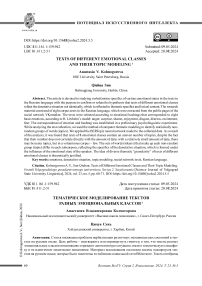Texts of different emotional classes and their topic modeling
Автор: Kolmogorova A., Sun Q.
Журнал: Вестник Волгоградского государственного университета. Серия 2: Языкознание @jvolsu-linguistics
Статья в выпуске: 5 т.23, 2024 года.
Бесплатный доступ
The article is devoted to studying verbalization specifics of various emotional states in the texts in the Russian language with the purpose to confirm or refute the hypothesis that texts of different emotional classes reflect the denotative situation not identically, which is reflected in thematic specifics and lexical content. The research material consisted of eight corpus texts in the Russian language, which were extracted from the public pages of the social network VKontakte. The texts were selected according to emotional hashtags that corresponded to eight basic emotions, according to H. Lцvheim’s model: anger, surprise, shame, enjoyment, disgust, distress, excitement, fear. The correspondence of emotion and hashtag was established in a preliminary psycholinguistic experiment. While analyzing the text collection, we used the method of computer thematic modeling to identify statistically non-random groups of words (topics). We applied the BERTopic neural network model to the collected data. As a result of the analysis, it was found that texts of 8 emotional classes contain an uneven number of topics, despite the fact that their number does not correlate directly with the amount of data: with a relatively small amount of data, there may be many topics, but in a voluminous corpus - few. The sets of words (tokens) that make up each non-random group (topic) differ in each subcorpora, reflecting the specifics of the denotative situation, which is formed under the influence of the emotional state of the speaker. The idea of diverse thematic “granularity” of texts of different emotional classes is theoretically justified.
Emotions, denotative situation, topic modeling, social network texts, russian language
Короткий адрес: https://sciup.org/149147498
IDR: 149147498 | УДК: 811.161.1:159.942 | DOI: 10.15688/jvolsu2.2024.5.5
Текст научной статьи Texts of different emotional classes and their topic modeling
DOI:
This publication is devoted to the problem of emotional analysis of text data. We formulate the research question as follows: is there a stable correlation between the topics that receive formal expression in words with high statistical significance for the text, and the emotion that the author of the text seeks to express? The search for an answer to this question lies in three overlapping subject areas: psycholinguistics, textology, and automatic text processing. In the latter, there is great interest in the use of topic modeling models. The topic modeling of a collection of textual documents determines which topics each document belongs to and which words form each topic. To do this, each topic is described by a discrete probability distribution of words, and each document is described by a discrete probability distribution of topics. Essentially, this model performs a soft clustering of documents. In this paper we consider the results of applying the BERTopic model to topic modeling of texts retrieved from the VKontakte “Overheard” public group and published under different emotional hashtags, which were then correlated with eight classes of emotion, according to H. Lövheim’s emotion model [Lövheim, 2012].
Related papers
It should be said that emotion analysis of texts is an increasingly popular research branch of the affective computing paradigm [Picard, 1997], which seeks to solve such problems as detecting different emotions expressed by humans in texts and classifying texts according to the leading emotion criterion [Blei, Ng, Jordan, 2003; Hakak et al., 2017; Li et al., 2007].
To solve both of the above tasks, expert linguistic attempts have been repeatedly made to identify some verbal and paraverbal markers of texts of a particular emotional class in order to use them as parameters fed to machine learning models as input [Kolmogorova, Kalinin, Malikova, 2019].
On the other hand, there is a well-established tradition in textual studies of identifying the emotional and semantic dominant of a text which is understood as a certain attitude, the center of interest, and therefore a certain position in all kinds of human verbal and averbal life [Shakhovsky, 2010, p. 41].
Based on the consideration of this dominant, attempts were made to psycholinguistically typologize texts into light, sad, funny, active, simple (cruel), beautiful, tired, complex and mixed [Belyanin, 2000]. It is established that for each of these types it is possible to identify a specific range of topics, a list of predicates. For example, on the material of dialect texts Y.V. Kositsina revealed that in the sad texts the external location prevails over the internal. Moreover, such texts are marked by the topics of the vicissitudes of fate and family, the sense of the inevitability of death, defenselessness of man before the laws of existence, the opposition of thematic spaces of past and present, the presence of words containing semantic components “solitude”, “blindness”, “gravity” [Kositsina, 2013].
Similarly, but using a neural network, we attempted to determine the groups of words that are most likely characteristic to the texts published by users of the social network VKontakte under the emotional hashtags corresponding to a particular emotion. By default, we suppose that such statistically significant words are topic cues that anchor main text themes.
Materials and methods
The research data consisted of eight subcorpora of texts from VKontakte. Their volume and the hashtags used to extract the text data are presented in Table. Each subcorpus is named according to the emotion with which it is associated.
We emphasize that the adequacy of the correlation between hashtags and emotional classes was tested experimentally in a group of 35 students, who in two experimental series were asked to correlate texts and emotional classes (160 texts were presented). We then calculated the percentage of the texts with certain hashtags that fell into a sample of one class or another. Thus, if more than 80% of the texts presented in the sample with a hashtag were associated by the informants with a particular emotion, the hashtag was considered reliable; if less than 80%, the hashtag was discarded.
As the main method, we used topic modeling by the BERTopic model, which, as research shows, is significantly superior in a number of parameters to the well-known model based on Latent Dirichlet Allocation [Sia, Dalmia, Mielke, 2020].
BERTopic generates “topics” in three stages: first, each document on the basis of the already trained model receives a vector representation, then, to conduct clustering, the dimensionality of vectors is reduced, finally, in the last stage, when the documents are already clustered, based on the standard tf-idf measure, the topics themselves are extracted from the clusters – lexemes or word forms that have the highest weight for these texts [Grootendorst, 2022]. In other words, each topic suggested by the model represents a group of words which are statistically relevant for the text or text collection. Word forms entering the same group are called its “terms”.
We used the Uniform Manifold Approximation and Projection model to reduce the dimensionality of the vectors, and the Hierarchical Density-Based Spatial Clustering of Applications with Noise method to cluster word forms.
The results of the topic modeling (topics, terms and their weights, as well as similarity matrices and distances between topics) of the texts of each of the eight emotional classes were compared with each other, and the results of the comparison were interpreted.
Results and discussion
Low Degree of Topical Granularity: Anger, Distress and Excitement
Despite the rather large size, compared to the other subcorpora, the subcorpus of “angry” texts allowed the model to identify only three topics (see Fig. 1).
The first topic contains a typical gist for the posts of this group – pissing off people who ... (бесят люди, которые...); the second reflects the negative attitude of people living in Russia towards those who live or want to live, or pretend to live abroad; finally, the third topic represents the word forms that reflect the intensity of feeling the
Subcorpora size and hashtags
From the subcorpus of “sad” texts it was also possible to extract only three topics (Fig. 2): the first is related to the idea of the finitude of time, the second – to the idea of loneliness, and the third – of love.
Even two topics were found by the model in the subcorpus of texts, showing the excitement (Fig. 3) despite the fact that this, as well as the subcorpus of “angry” texts, is one of the largest subcorpora in the sample.
The first topic manifests the idea of time, while the second is related to effective weight loss. Interestingly, this subcorpus represented a variety of situations that evoked the emotion of elation-not just those related to long-awaited weight loss (examples 1–2), but the model apparently had difficulty to cluster them:
-
(1) I teach a foreign language. I was invited to lead a group of eight people in a foreign language studio; I came – and there are all men and guys. All good-looking, intelligent, educated, and all
unmarried! I am ugly, fat, short, unremarkable and unattractive absolutely; I do not know what happened, but all the students come to class with a perfectly prepared homework, dressed with a needle, smelling of perfume, stretching their hands, want to answer, and the fourth student asked me out. At home there are bouquets from two other students. Either it’s the magic of the German language, or I don’t even know...
Я преподаю иностранный язык. Меня пригласили руководить группой из восьми человек в студии иностранных языков; я пришла – а там сплошь мужчины и парни. Все красивые, умные, образованные и все неженатые! Я некрасивая, толстая, низкорослая, ничем не примечательная и абсолютно непривлекательная; я не знаю, что случилось, но все ученики приходят на урок с идеально подготовленным домашним заданием, одетые с иголочки, пахнущие духами, протягивают руки, хотят ответить, и четвертый ученик пригласил меня на свидание. Дома меня ждут букеты от двух других студентов. То ли это волшебство немецкого языка, то ли я даже не знаю...
-
(2) My wife gave me a ticket to the World Cup finals. She bought it long beforehand, as a surprise. She gave me half my salary, poor thing. Now my wife,

Fig. 1. Topics and terms of texts manifesting the emotion of anger

Fig. 2. Topics and terms of texts manifesting the emotion of distress
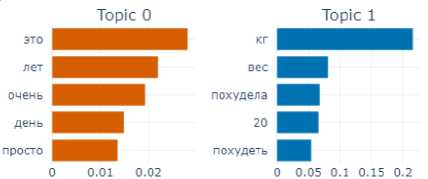
Fig. 3. Topics and terms of texts manifesting the emotion of excitement
father-in-law, and mother-in-law and I are flying to Hawaii. A fan from France bought my ticket for 100 times the price! I love my wife. And I never liked soccer.
Моя жена подарила мне билет на финал Чемпионата мира. Она купила его задолго до этого, в качестве сюрприза. Бедняжка, она отдала мне половину моей зарплаты. Сейчас мы с женой, тестем и тещей летим на Гавайи. Болельщик из Франции купил мой билет в 100 раз дороже! Я люблю свою жену. И мне никогда не нравился футбол.
Middle Degree of Topical Granularity: Disgust, Fear, Shame
The opposite of the previously analyzed case situation is observed in modeling the subcorpus of “disgusting” texts: although they are the smallest in volume, they allowed the model to extract 9 topics.
Among them predictably well stand out topics related to the physiological and bodily spheres (Fig. 4): toileting, washing the body and hair, male-female relations, women of the family, olfactory sensations, and body parts such as the mouth.
The similarity matrix, by the way, shows that this last topic (0) is very similar to all the other topics that deal with the concepts of relationship of the opposite sexes (Topics 4, 6, 7) (Fig. 5).
In the group of texts manifesting fear (Fig. 6), the model identified six topics: these are topics connected with the subject “persons for whom the fear is felt” (Topic 0 – mother), or the place where the fear is usually felt (Topic 4 – the bathroom and the toilet), or, actually, why the fear is felt, its cause (Topic 1, 2, 5) – a car accident, cancer, mental disorder.
At first glance, the weakly interpreted Topic 3 turns out to be more understandable with the help of the similarity matrix: it is very similar to Topic 0 (Fig. 7).
Thus, these two topics seem to develop the same proposition – the fear that the dearest person, the mother, may leave ( mother , her , very ), the regret after her demise ( why , you know , come back ).
The final emotion for this block is the emotion of shame. In this subcorpus, which is small enough, the model has revealed 9 topics (Fig. 8).
In their assemblage we can also identify a number of components of the situation of experiencing the shame: time ( long ago , not now – Topic 8; in school childhood – Topic 2), participants of the shame situation ( husband , boyfriend – Topic 4), emotional reactions ( became very ashamed – Topic 3), internal experiences ( could not tell anyone – Topic 7), objects with which the shame was associated – for example, money (Topic 1).
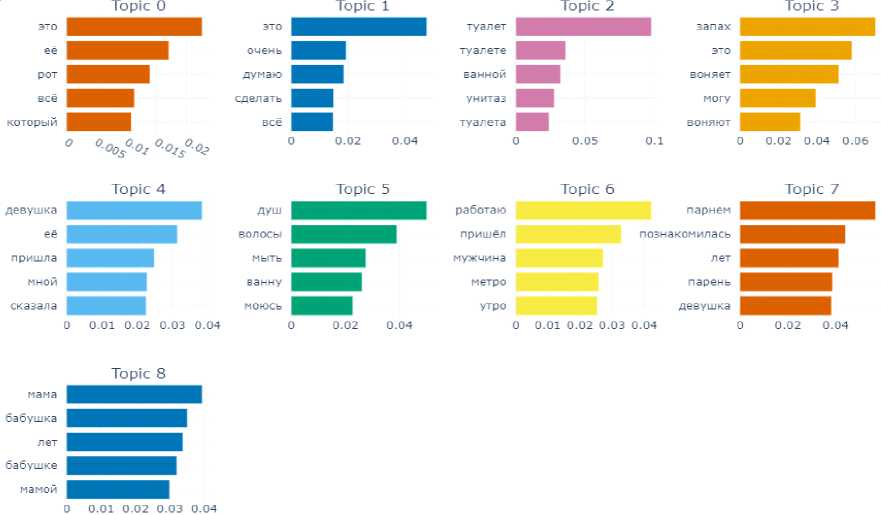
Fig. 4. Topics and terms of texts manifesting the emotion of disgust
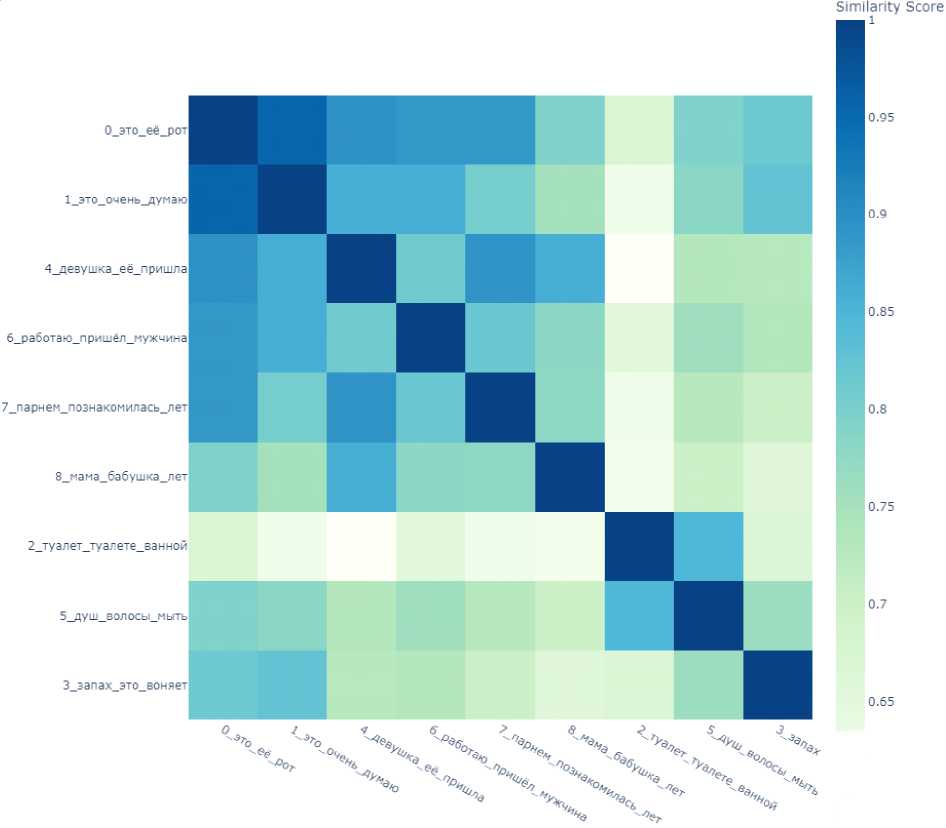
Fig. 5. Similarity matrix for topics in texts manifesting the emotion of disgust
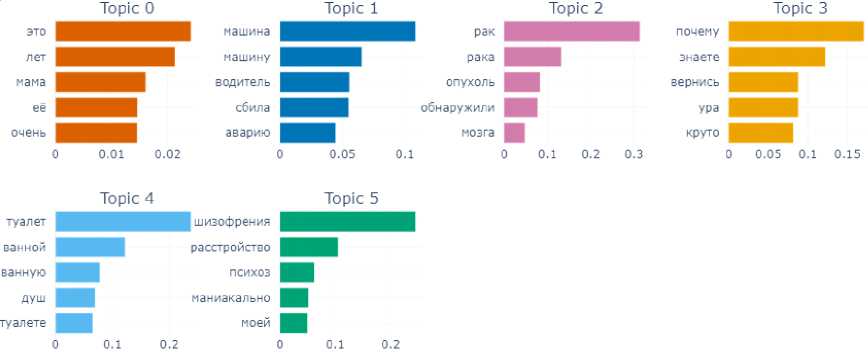
Fig. 6. Topics and terms of texts manifesting the emotion of fear
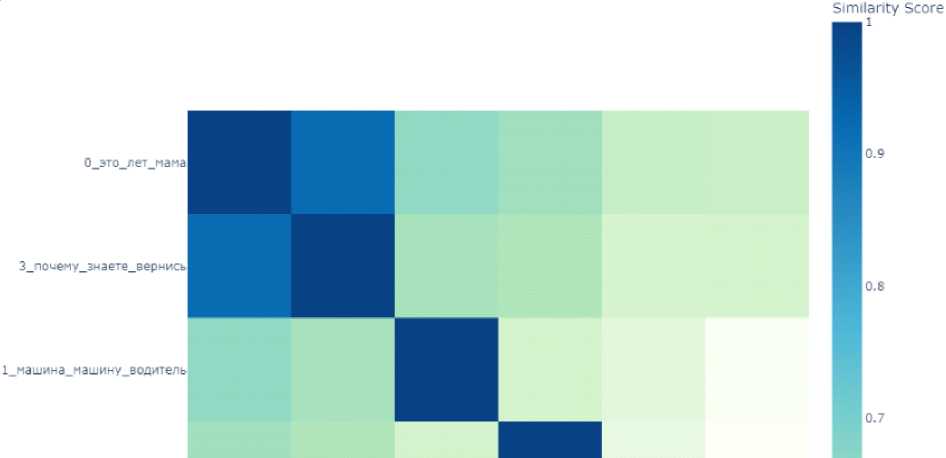
Fig. 7. Similarity matrix for topics in texts manifesting the emotion of fear
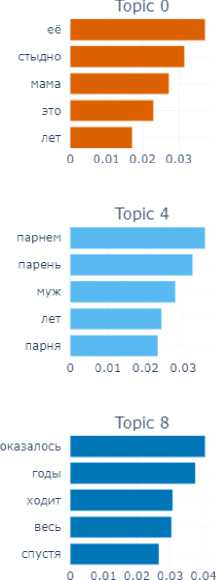
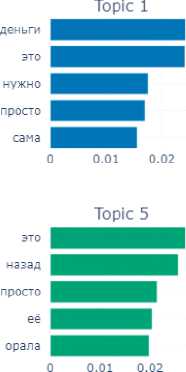
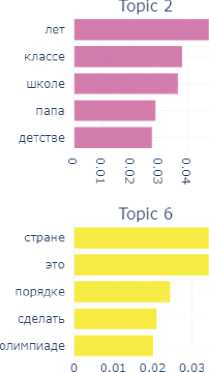
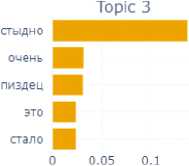
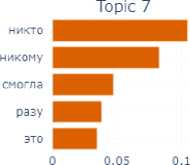
Fig. 8. Topics and terms of texts manifesting the emotion of shame
The analysis of the similarity matrix showed that Topics 5, 6, and 8 have the greatest similarity. The map of distances between topics showed that there are, in general, only two clusters: the first cluster includes Topics 5, 6, 7, and the second cluster includes all the others.
High Degree of Topic Granularity: Enjoyment and Surprise
The subcorpus of “joyful” texts was also easy to process for BERTopic model: 13 topics were identified (Fig. 9).
The topics highlighted by the model are quite harmoniously related: work (Topic 0), happiness (Topic 1, 7), family (Topic 3), love (Topic 4–5), having an apartment (Topic 6), pregnancy (Topic 8), as well as more frequent reasons for happiness – dental care (Topic 2), hair color (Topic 9), getting rid of extra pounds (Topic 10), successful surgery (Topic 11), birthday (Topic 12).
The distance between the topics (Fig. 10) shows that they form four clusters: the cluster of Topics 7, 1, 9 (happiness + hair color), the leftmost cluster – Topics 5, 11, 8 (girl, surgery, pregnant), the next – Topics 2 and 0, and the fourth – Topics 3, 4, 6, 10 (family+love+flat+weigt loss).
The similarity matrix shows that Topics 2, 5, 7, 9, 12 are the most similar, which seems to reflect the most frequent reasons for happiness: love, changes in hairstyle, birthday.
The largest number of topics was highlighted by the model on the corpus of “surprising” texts (Fig. 11).
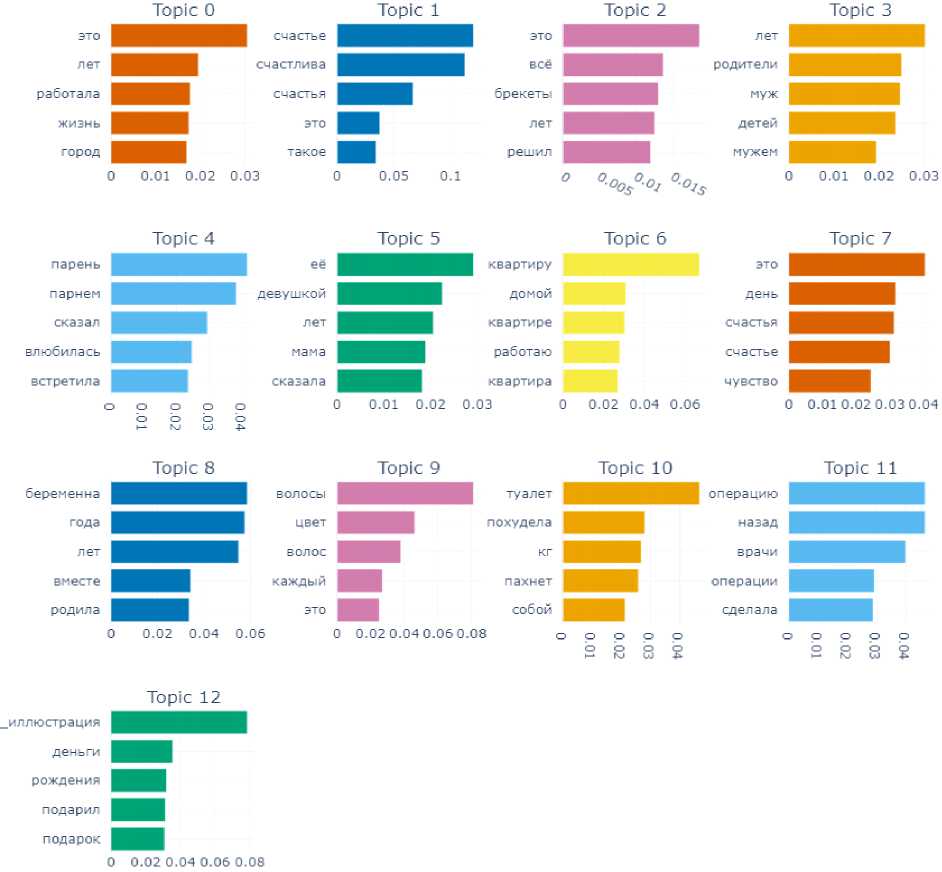
Fig. 9. Topics and terms of texts manifesting the emotion of enjoyment
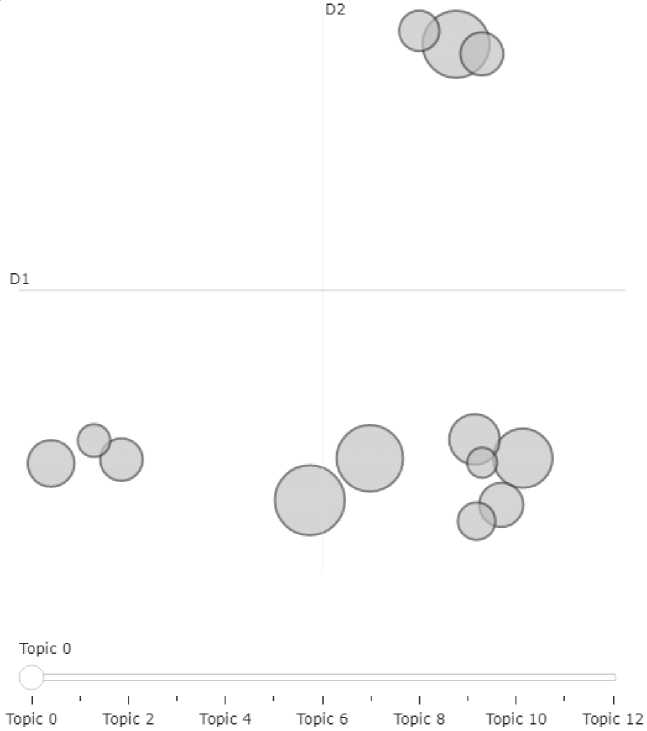
Fig. 10. Intertopic distance map in the subcorpus of texts manifesting the emotion of enjoyment
Note that compared to the previous subcorpora, these topics proved difficult to interpret, but even here we can identify ideas of family (Topic 4), relationships with the opposite sex (Topic 8, 9, 10), fear (Topic 14), shopping (Topic 12), preferences in smells and tastes (Topic 5), and own opportunities (Topic 2).
As for the distances between topics (Fig. 12), the model identified three clusters.
Topics 0, 3, 6, and 4 were in the first cluster; Topics 9, 8, and 10 were in the second cluster; and all the others were in the third cluster.
Conclusion
The experiment on the application of the neural network model of topic modeling to the pool of emotional texts from social networks allowed us to draw several conclusions.
Firstly, from the point of view of texts’ affordances for clustering we can distinguish three groups of emotional texts: “angry”, “sad” and “excited” texts cause difficulties in clustering, so they have maximum 3 topics; “shameful”, “terrible” and “disgusting” are clustered relatively well – 8–9 topics are identified; finally, “happy” and “surprising” are easily clustered – 12– 15 topics.
This observation provides us not so much with some technical information about the specificity of BERTopic, as with the structure and semantics of the texts of different emotional classes. Apparently, it is worth talking about the correlation between the degree of thematic granularity of the texts and the nature of the emotions they are meant to convey: low, middle and high.
Secondly, the topics selected by the model really reflect the specificity of emotional experiences and can be used in the future as
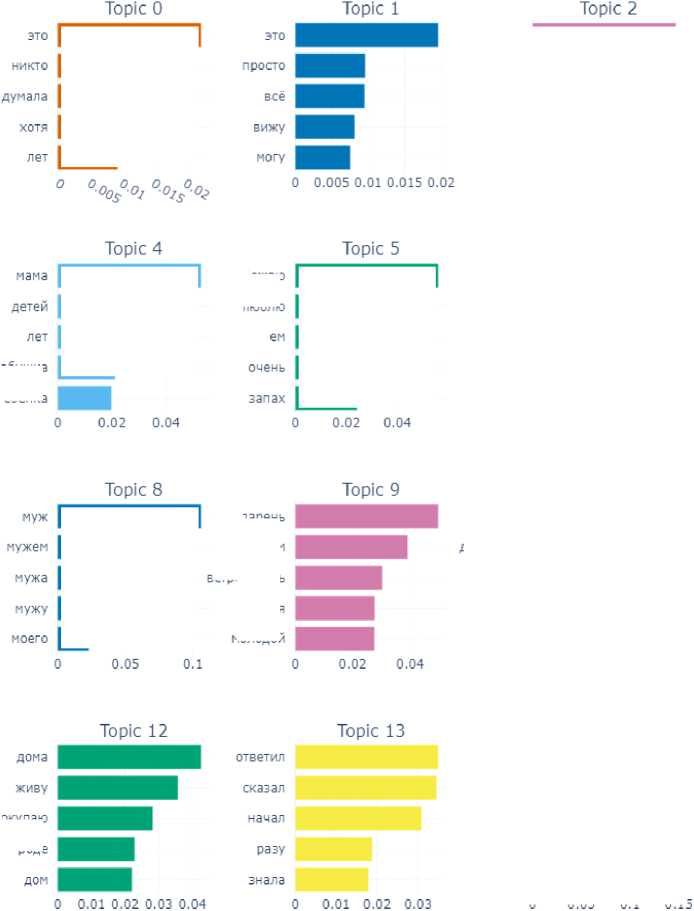
Fig. 11. Topics and terms of texts manifesting the emotion of surprise

бабушка
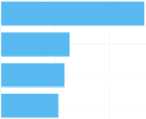
ребёнка
покупаю
городе
обожаю люблю

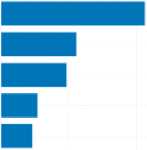
парень парнем встречалась молодой
парня

Topic 3

attributes for the emotional classification, for the automatic detection of emotions in the texts of social networks.
Third, in the experiment conducted, the hypothesis that there is a correlation between the emotion expressed in the text and the nature of the thematic content was generally confirmed. Despite the fact that a number of topics are “cross-cutting” (e.g., the topic of weight loss is characteristic of both excitement and joy subcorpora, and the topic of relations with the opposite sex is characteristic of happiness, shame, and disgust text classes), the majority of topics are specific (e.g., the topic of time gone is characteristic only of shame text class, and the topic of gastronomy preferences is characteristic only of surprise class).
Thus, we can conclude that the use of the method of topic modeling is a relevant way to describe the specificity of semantics, the thematic deployment of texts of different emotional classes.
NOTE
1 The article was prepared based on the materials of the project “Text as Big Data: Methods and Models of Working with Big Text Data”, which is carried out within the framework of the Fundamental Research Program of the National Research University Higher School of Economics (HSE University) in 2024.
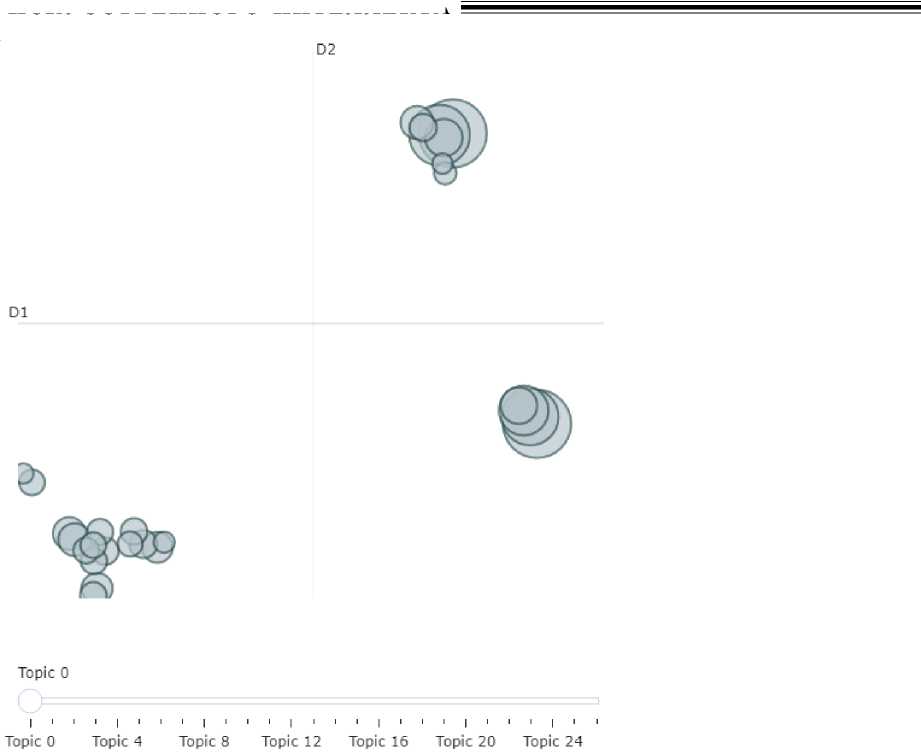
Fig. 12. Intertopic distance map in the subcorpus of texts manifesting the emotion of surprise
Список литературы Texts of different emotional classes and their topic modeling
- Belyanin V.P., 2000. Osnovy psikholingvisticheskoy diagnostiki (Modeli mira v literature) [Foundations of Psycholinguistic Diagnostics (World Models in Literature)]. Moscow, Trivola Publ. 248 p.
- Blei D.M., Ng A.Y., Jordan M.I., 2003. Latent Dirichlet Allocation. The Journal of Machine Learning Research, no. 3, pр. 993-1022.
- Grootendorst M., 2022. BERTopic: Neural Topic Modeling with a Class-Based TF-IDF Procedure. DOI: 10.48850/arXiv.2203.05794
- Hakak N., Mohd M., Kirmani M., Mohd M., 2017. Emotion Analysis: A Survey. Proceedings of the International Conference on Computer. Communication and Electronics, 1–2 July, pp. 397-402. DOI: 10.1109/COMPTELIX.2017.8004002
- Kolmogorova A., Kalinin A., Malikova A., 2019. Tipologiya i kombinatorika verbalnykh markerov razlichnykh emotsionalnykh tonalnostey v internet-tekstakh na russkom yazyke [Types and Combinatorics of Verbal Markers of Different Emotional Tonalities in Russian-Language Internet Texts]. Vestnik Tomskogo gosudarstvennogo universiteta [Tomsk State University Journal], vol. 448, pp. 48-58. DOI: 10.17223/15617793/448/6
- Kositsina Yu.V., 2013. Statiko-dinamicheskaya model tematicheskoy organizatsii monologicheskogo dialektnogo teksta: avtoref. dis.... kand. filol. nauk [Statical and Dynamical Model of Topical Organization of Monological Text in Dialects. Cand. philol. sci. diss.]. Kemerovo. 213 p.
- Li H., Pang N., Guo S., Wang H., 2007. Research on Textual Emotion Recognition Incorporating Personality Factor. ROBIO 2007: IEEE International Conference on Robotics and Biomimetics, pp. 2222-2227.
- Lövheim H., 2012. A New Three-Dimensional Model for Emotions and Monoamine Neuro-Transmitters. Medical Hypotheses, vol. 78, рр. 341-348.
- Picard R., 1997. Affective Computing. Cambridge, The MIT Press. 306 p.
- Sia S., Dalmia A., Mielke S.J., 2020. Tired of Topic Models? Clusters of Pretrained Word Embeddings Make for Fast and Good Topics Too! DOI: 10.85550/arXiv.abs/2004.14914
- Shakhovskiy V.I., 2010. Emotsii: dolingvistika, lingvistika, lingvokulturologiya [Emotions: Protolinguistics, Linguistics, Lingvoculturology]. Moscow, Librokom Publ. 128 p.

